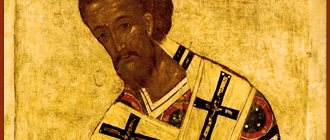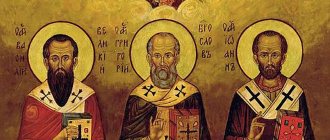Height of pastes. service. St. John Chrysostom. Six words about the priesthood.
I didn't want to be a pastor. I wrote 6 words as a layman.
Word 1: St. John hides from ordination while his friend Basil is being ordained, justifying his cunning in the Old Testament: Moses took the jewelry from the Egyptians, Jacob stole the birthright. Proves that Vasily is more worthy.
Word 2: It is important to feel what is missing for the priesthood: love for Christ, love for the flock (freedom of the flock and the power of the priest).
Word 3: Speaks of two poles, as it were. On the one hand, he speaks of the highest, humanly incomprehensible height of pastoral service, the Eucharistic service. And on the other hand, the abyss of temptations and dangers that await the shepherd on this path (the first is vanity, if he succumbed, he fell into the power of monsters: anger, despondency, envy, enmity, slander, condemnation, deception, hypocrisy, intrigues, indignation at people innocent, pleasure in the ill-being of employees, sadness in their prosperity, desire for praise, addiction to honors, teaching with gratification, ungrateful caresses, low people-pleasing, contempt for the poor, helpfulness to the rich, unreasonable and harmful preferences, favors dangerous both for those who give and for those who receive them, slave fear). One of the signs that a person can be a priest is the desire to serve the Eucharist. It is important not to be afraid of being defrocked, like a dying warrior, because there will be persecution. The main thing is loyalty to Christ. He predicted his fate with this.
Word 4. He says that the part is justified not by the fact that we did not want the priesthood, by the fact that they were installed involuntarily. Important quality of pastes. – the ability to correctly present dogmas.
Word 5. The Truth of God must be brought to the flock.
Word 6. About the high purity that a shepherd must have: one who prays for the city and the Universe must be purer than those for whom he prays, one who communicates with the Holy Spirit must be pure. Compares the abbot and the city. priest: city priest is more difficult, because monks have a Rule. Priest serves the Liturgy (monks did not yet serve then).
Preparation for ordination.
Cleansing and enlightening yourself. Testing the will through obedience, mercy (doing good to the unworthy). Purification of the heart: from repentance. Enlightenment of the mind: knowledge of Holy Scripture, dogmas, liturgical tradition. Communication with experienced shepherds. The priest lives in a glass house.
Procedure: 1. Diocesan Council; 2. Confession with the diocesan confessor (protege); 3. The date of consecration is not announced in advance (in Moscow and Moscow Region).
The gracious gifts of shepherding.
Grace: 1. To cover the infirmities of the shepherd, 2. Given in advance; 3. To perform the Sacraments; Sacrament – a new relationship with God; 4. Pledge - what will be fulfilled. “God gave us the Spirit of power, love, chastity” - St. Paul. Grace acts on the body: most priests have illnesses, but they endure more stress than healthy ones. The spirit of strength is will, the spirit of sacrificial love is the flock, the spirit of chastity is spiritual prudence. The layman must “earn” the gifts, but the pastor receives them immediately.
Eucharistic ministry of the shepherd according to the teachings of Nicholas Cabasilas.
Cabasilas speaks of the power of the Sacraments. It is up to us not to waste this power. Introduces a third person into the Sacrament - the Temple (in addition to the flock and the priest). . Christ participates as a sacrifice in the substance of the Sacrament of the Eucharist, and as a Priest He participates in the Sacrament through the Temple. Christ is the Anointed One. The gifts of the Holy Spirit are anointed through Myrrh. The temple will be anointed with myrrh. In this sense, the Temple becomes, as it were, an Altar. The temple is the hand of Christ, giving the Sacraments. He argued with Catholics who serve in the 1st person. The words “Take and eat...” have creative power because they are the words of Christ, and not because we pronounce them.
The Eucharist and the sacrifice of pastoral ministry. Martyrdom of St. Polycarp of Smyrna.
“I am the wheat of God... so that I may become the bread of Christ” - Ignatius the God-Bearer.
Martyrdom of St. Polycarp (Gospel parallels): “the body was not like one being burned, but like bread being baked”; St. P. does not go to death himself, but waits for him to be brought (like Christ); He is betrayed by his household (Judas); They are taken to the city on a donkey; Betrayed on Good Friday; they want to crucify, but they only bind.
The Eucharistic sacrifice is projected throughout the life of the priest. In this sense, he is like an image of Christ: presbyter, priest, sacrifice.
“Whoever honors a priest will also honor God; whoever begins to despise a priest will one day gradually come to insult God... As long as you are in the Church, you will always be saved with a sinful priest, if you want, but with detractors outside the Church You will always be lost" St. John Chrysostom.
ABOUT HONORING THE PRIESTS
St. John Chrysostom
Chrysostom's conversation on 2 Timothy
“ Whoever honors the priest will also honor God; whoever begins to despise the priest will one day gradually come to insult God. Those who accept you, said the Lord, accept Me (Matthew 10:40); His priest, it is said elsewhere, give honor (Cf.: Numbers 18:8).
The Jews began to despise God because they despised Moses and threw stones at him. He who reveres the priest will reverence all the more before God.
Even if the priest were wicked, God, seeing that out of reverence for Him you honor even those unworthy of honor, will Himself reward you. If he who receives a prophet in the name of a prophet, as the Lord says, will receive a prophet in return (Matthew 10:41), then, of course, the one who respects the priest, listens to him and obeys him will receive a reward. If in the matter of hospitality, when you do not know whom you are accepting, you receive such a reward, then much more will you receive it when you obey the one whom the Lord commands to obey. Moses' seats, He said, are gray... (Matthew 23:2).
Don't you know what a priest is? He is the angel of the Lord. Is he speaking his own way? If you despise him, then you despise not him, but the God who ordained him. How do you say it is known that God ordained him? But if you are not convinced of this, then your hope is vain; for if God does not do anything through him, then you neither have Baptism, nor partake of the Mysteries, nor receive blessings, and, therefore, you are not a Christian.
How, you say, does God really ordain everyone, even the unworthy? God does not ordain everyone, but through everyone He Himself acts, even if they are unworthy, for the salvation of the people. If He spoke to the people through a donkey and Balaam, a wicked man (Num. 22), then much more through a priest. What does God not do for our salvation? What doesn't he say? Through whom does it not work? If He acted through Judas and through those prophets who say: we do not know you: get away from Me, you workers of lawlessness (cf. Luke 13:27; Matt. 7:23) and who cast out evil spirits, then all the more will He act through priests. When we begin to examine the life of those in authority, it means that we ourselves want to be ordainers of teachers, and thus everything is distorted: the legs become at the top, and the head is at the bottom.
Listen to Paul, who says: I am not great... (1 Cor. 4:3) and again: why do you condemn your brother? (Rom. 14:10). If one should not condemn a brother, let alone a teacher. If God commanded you to do this, then you would do well, and you would sin if you did not do so, but if on the contrary, then do not be impudent and do not go beyond your limits. When the calf was made, Aaron's accomplices rebelled against Aaron: Korah, Dathan and Abiron - but what, didn't they die?
Everyone - take care of your own affairs. Whoever teaches an incorrect teaching, do not listen to him, even if he were an Angel, and if someone teaches a right teaching, then look not at his life, but at his words. But, you will say, the priest does not give to the poor and does not manage affairs well. How do you know this? Before you know for sure, do not blame, be afraid of responsibility. Many people are convicted on suspicion.
Imitate your Lord; listen to what He says: I will come down and see if, because of their cry... they are done: and if not, let me understand (Gen. 18:21). Even if you have learned, researched and seen, and then wait for the Judge, do not anticipate the right of Christ; He has the right to judge, not you; you are the last slave, not the Lord; You are a sheep, do not judge the shepherd, lest you be punished for what you accuse him of. But why, you say, does he tell me, but doesn’t do it himself? - He doesn’t say it himself. If you obey only him, you will not receive a reward; Christ commands you.
What am I saying? Even Paul should not be obeyed if he said anything of his own, anything human, but he should be obeyed as an Apostle, having Christ in him, who spoke through him. Let us not judge other people's affairs, but each his own; explore your own life better. But, you say, the priest should be better than me. Why? - Because he is a priest. What does he not have more than you? Is it labors, dangers, worries or sorrows? How is he not better than you, having all this?..
In any case, if you consider yourself better than another and do not sigh, do not hit yourself in the chest, do not bow your head, do not imitate the publican, then you have ruined yourself, even if you were really better. Are you better than the other? Be silent, so that you remain the best; and as soon as you speak, you will lose everything. If you think about yourself like that, then you are no longer like that; and if you don’t think like that, you will gain even more...
Tell me: if you, having received a wound, come to a hospital, then instead of applying medicine and treating the wound, will you begin to find out about the doctor, whether he has a wound or not? And if he has, do you care about it? And because he has it, do you leave your wound without healing and say: he, as a doctor, should have been healthy, but since he, being a doctor, is himself unhealthy, then I leave my wound without healing? So here, if the priest is not good, will this be a consolation for the subordinate? Not at all. He will receive a certain punishment - you will also receive what you deserve and deserve. The teacher performs only the service. For, says Scripture, they will be taught of God (John 6:45) and will not say, “Know the Lord; for you know Me, from the least of them even to the greatest of them...” (Jer. 31:34).
Why, you say, does he occupy such a place? Let us not, I exhort you, speak ill of teachers, let us not talk about them, so as not to harm ourselves; Let us examine our affairs and not speak ill of anyone...
In a father, even if he has countless weaknesses, the son covers everything; Do not be glorified, says the Wise One, in the dishonor of your father, for the glory of your father’s dishonor is not yours : even if your understanding fails, have forgiveness (Sir. 3, 10. 13). If this is said about carnal fathers, then all the more must it be said about spiritual fathers.
Be ashamed: he serves you every day, offers to read the Scriptures, decorates the house of God for you, watches for you, prays for you, stands and intercedes for you before God, makes petitions for you, performs all his ministry for you. Be ashamed of this, imagine this and approach it with all reverence.
Is he not good? But tell me, what of this? And does a good man himself impart great blessings to you? No! Everything happens according to your faith. And the righteous will not benefit you at all if you are an unbeliever; and the wicked will not harm you at all if you are a believer . God also acted through the thieves at the ark when He wanted to save His people. Can the life of a priest or virtue accomplish anything like this? The gifts of God are not such that they depend on priestly virtue: everything comes from grace; The priest’s job is only to open his mouth, but God does everything; the priest performs only visible actions...
There is not a single person who is as far from another as John (the Baptist) is from Jesus, and yet the spirit descended on Him at the Baptism of John, so that you would know that God arranges everything, that God does everything. I want to say something wonderful, but don’t be amazed or embarrassed. What is it? - The offering in the Eucharist is the same, no matter who makes it, Paul or Peter; it is the same that Christ taught to His disciples, and the priests do the same now; this is in no way lower than that, for this too is not sanctified by people, but by God Himself , who sanctified it even then.
Just as the words now spoken by the priest are the same as those spoken by the Lord , so the offering is the same; Equally, the Baptism is the same, which He administered. So everything depends on faith... And this offering is the Body of Christ just like that; and whoever thinks that it is lower than that does not know that Christ is both now present and now active.”
Word of St. John Chrysostom, how to honor the Priest:
«If a Priest teaches the right, do not look at his life, but listen to his teaching.
And don’t say: why does he teach me, but doesn’t do it himself? “He has the responsibility to teach everyone, and if he does not fulfill it, he will be condemned by the Lord for this.” And if you do not listen to him, you will also be condemned, for this is what the Lord says : listen to you, He listens to Me; but if you are swept away, I will be swept aside; and those who blaspheme you, blaspheme me.
It is not the business, brethren, for the sheep to blaspheme the shepherd; He offers service every day for you and for your brothers; morning and evening in church and outside church he prays for you. Think about all this and honor him as a father.
You will say: “he is sinful and evil.” What do you care? Even if a good person prays for you, what good does it do you if you are unfaithful? And if you are faithful, then his unworthiness will not harm you at all. “Grace is given from God. The priest only opens his mouth, but God does everything.”
Isn’t it clear from here, brethren, that God works with all priests, even if they are unworthy? Think about it: who saves us: the priest or God? Who gives us grace in the sacraments? Who accepts our prayers in church? Whose word is read or spoken by the priest in the temple? Obviously, God's and, obviously, all our salvation is in the hands of the Lord, and not the priest.
And besides: if you truly want to be saved through a priest, then look for a sinless priest. Will you find one? Alas, we are all sinners from first to last. No one is clean from filth, even if only one day of his life on earth.
Therefore, rather than despise priests, whatever they may be, than run from priests and through them from the Church, isn’t it better to run from their detractors?
As long as you are in the Church, you will always be saved with a sinful priest if you want, but with detractors outside the Church you will always be lost ; for, no matter how holy they may seem to you, never forget that they have neither the Church, nor the sacraments, and, consequently, the grace of God. Amen.
Share
Liked this:
Like
Similar
Filed under: Uncategorized | Tagged: John Chrysostom, Priesthood |








